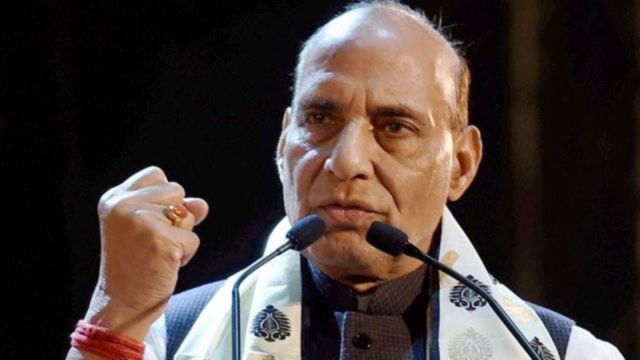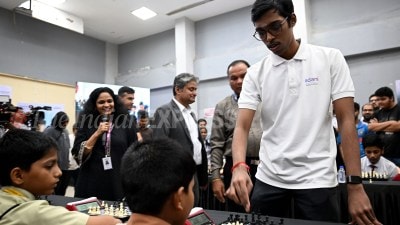Defence Minister Rajnath Singh said on Tuesday that India’s leading investigating agencies are conducting a “swift and thorough” inquiry into Monday’s blast near Delhi’s Red Fort, adding that those responsible will not be spared.
At least 13 people died in the blast that took place in a car near the Red Fort Metro Station on Monday evening. There is no official word yet on what caused it.

“I wish to assure my fellow citizens that the country’s leading investigative agencies are conducting a swift and thorough inquiry into the incident. The findings of the investigation will soon be made public,” Singh said at a defence conclave, assuring that those responsible for this tragedy will be brought to justice.
He also extended his condolences to the families of the blast victims. “I pray to God to grant strength and solace to the bereaved families in this hour of deep grief,” he said.
Singh was delivering the inaugural address at the second edition of the Delhi Defence Dialogue on ‘Harnessing New Age Technology for Defence Capability Development’, organised by the Manohar Parrikar Institute for Defence Studies and Analyses (MP-IDSA). The two-day event, being held from November 11–12, brings together policymakers, defence experts, industry leaders, and scholars to discuss the evolving role of technology in national defence.
Call to embrace AI, quantum computing
Singh said that for India to move from a consumer to a creator of technology, there is a need to not only acquire innovations, but create the conditions where niche products thrive through sound processes, agile institutions, and a spirit of collaboration that unites the soldier, the scientist, the start-up and the strategist.
Singh called for building systems and ecosystems that make the creation and adoption of new technology natural, swift and self-sustaining. He also emphasised the need to adapt to disruptive technologies such as artificial intelligence (AI), machine learning, quantum computing and swarm tech, adding that the true test of advancement lies in how the apparatus functions.
Story continues below this ad
“Harnessing technology is not just about adding new tools; it is about making our institutions more agile, anticipatory and adaptive, and creating a defence architecture that learns continuously, responds instantly and evolves relentlessly in tune with the pace of change,” he said.
He further asserted that high-speed data link, AI-driven algorithm, quantum computing and autonomous systems will achieve less without quick internal processes and robust human and institutional capacity to absorb and apply them effectively.
He highlighted that much of defence readiness rests on “invisible technologies which include secure data architectures, encrypted networks, automated maintenance systems, and interoperable databases”.
Nurturing a culture of innovation
Singh said the defence industrial base is expanding with renewed confidence and clarity, with the synergy among the DRDO, the armed forces, industry and academia creating a virtuous cycle of research, testing, field feedback, and innovation.
Story continues below this ad
He emphasised that India can no longer be content with merely catching up to global innovation, and there is a need to continue nurturing the culture of innovation by encouraging collaboration over silos, and speed over procedural inertia.
“Technology leadership does not emerge from isolated brilliance, it grows from a national ecosystem that rewards ideas, tolerates failures, and celebrates breakthroughs,” Singh said.
He added that it is essential that aatmanirbharta or self-reliance extends beyond manufacturing indigenous systems to digital sovereignty—control over the algorithms, data, and chips that power platforms.
“True strategic autonomy will come only when our code is as indigenous as our hardware. We are, therefore, encouraging secure, indigenous software stacks, trusted semiconductor supply chains, and home-grown AI models trained on Indian data,” Singh said, adding that technology is not meant to replace human judgment, but to amplify it.
Story continues below this ad
“We must also invest in the ethical, psychological, and legal dimensions of these emerging technologies. India, as a civilisational power, can and must lead the conversation on responsible and humane use of military technology,” he said.
Singh pressed on the fact that technology must be seen not only as a force multiplier, but also as a resource optimiser. He endorsed leveraging technology and data analytics in the capital procurement process to improve decision-making and ensure optimal use of every resource.
“In many advanced nations, the concept of life-cycle cost is deeply woven into their procurement frameworks. Recently, I have directed that we too must begin to assess these sustenance costs right at the inception stage of every procurement proposal. This will help us see the full picture, not only what we invest today, but what we must sustain tomorrow,” he said.
He urged the armed forces to remain on the lookout for best global practices not just in technology related to equipment, but also those related to training, logistics, planning, and management systems.
Core objective of warfare is victory: CDS
Story continues below this ad
At the event, Chief of Defence Staff (CDS) General Anil Chauhan, in a special address, emphasised that the core objective of warfare remains victory, as conflicts offer no second chances.
The CDS highlighted the recent Operation Sindoor as a compelling example of modern warfare, where precision strike capabilities, network-centric operations, digitised intelligence, and multi-domain tactics were effectively deployed within a compressed timeframe.
He highlighted the imperative for military leadership to adapt swiftly to these evolving realities, noting that technological superiority has become the decisive factor in determining success on the battlefield. He added that warfare remains fundamentally about securing victory, and those who lead in technology will ultimately prevail.
Ambassador Sujan Chinoy, Director General, MP-IDSA, said armed forces worldwide are transitioning from the industrial to the information and cyber age and that emerging technologies such as AI, robotics, and quantum physics are becoming crucial determinants in warfare and security.
Story continues below this ad
He stressed the importance of striking a balance between foreign technology acquisition and indigenous defence manufacturing, advocating for a self-reliant approach under India’s atmanirbharta policy, while acknowledging the challenge of integrating advanced technologies while ensuring independence in critical defence capabilities.









